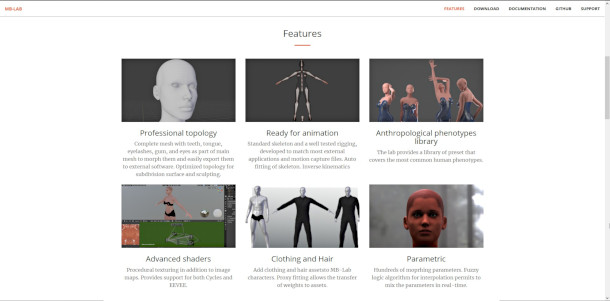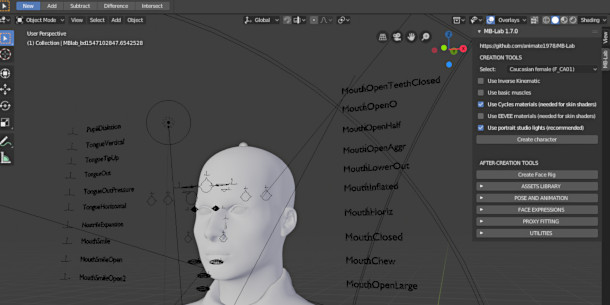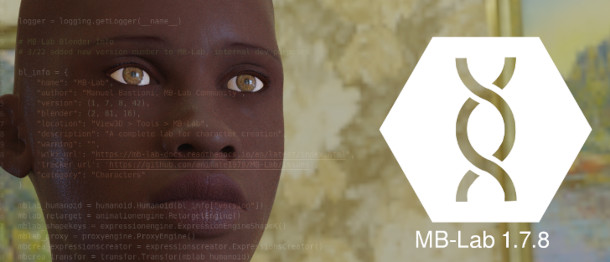Create free, facially rigged CG characters with MB-Lab 1.7.8

Originally posted on 22 July 2019. Scroll down for news of the 1.7.8 update.
The development team behind MB-Lab has released MB-Lab 1.7.5, the first stable build of the promising open-source 3D character generation tool for Blender 2.80.
The software, in development since last December, is a community fork of the popular, but now discontinued, Manuel Bastioni Lab.
Features in the release include a new GUI in line with that of Blender 2.80 itself, a new tongue shader and improvements to the eye and iris shaders, and FACS support in the facial rig generated by the software.
A community-led efford to continue Manuel Bastioni Lab
Led by lighting artist Ted ‘animate1978’ Gocek, the MB-Lab project is a community fork of popular Blender-based CG character generator Manuel Bastioni Lab, which was unexpectedly discontinued last November.
The online documentation describes the original code as “still only fully understood by Manuel Bastioni himself”, making the new fork both a matter of adding new features and figuring out how old ones work.
Create customisable, fully rigged CG characters for Blender and other DCC software
Like its predecessor, MB-Lab generates highly customisable human characters for use in CG projects, including the options to control gender, physique and ethnic origin.
The meshes are anatomically detailed, including eyebrows, teeth, tongues, eyelashes and gums, and fully rigged, including finger and facial rigs, with a simulated muscle armature.
Once generated, characters can be posed in the software, or have polygonal hair or clothing fitted to them.
Finished characters can be exported as .json files, or as Blender’s native .blend files, then re-exported to other DCC applications in any of the formats that Blender supports, including FBX, Collada and OBJ.
Now officially compatible with Blender 2.80
MB-Lab also makes the software compatible with Blender 2.80, the long-awaited major update to Blender, currently expected to ship in the next week or so.
That includes introducing new shader networks for Eevee, Blender 2.80’s real-time render engine, as well as the existing Cycles renderer.
The team also previously introduced support for the Principled BSDF shader introduced in Blender 2.79, updating skin settings for PBR workflows.

New in MB-Lab 1.7.5: new GUI, tongue shader and FACS-compatible facial rig
In addition, MB-Lab 1.7.5 revamps the software’s user interface, bringing it in line with the more icon-driven interface of Blender 2.80 itself.
Other changes include a tongue shader separate to the main skin shader, and updates to the eye shaders.
The software’s facial rig also gets its first update since its introduction, introducing support for FACS, the Facial Action Coding System widely used in VFX and AAA games.
Users can now also save config files for bone settings when importing animation data in BVH format.

Updated 5 August 2020: MB-Lab 1.7.8 is out, adding a much-requested feature: the option to add your own custom character to the MB-Lab library.
The change makes it possible to use the software to create characters for closed-source projects like commercial games: something previously prohibited by the AGPL licence used for its default characters.
However, in a post on the BlenderArtists forum, Gocek warns that building a base character in Blender is “not an easy process and the documentation is still being worked on”.
In addition, the hair engine – a new particle-based hair system, added to the software since our original story – now creates hair shaders for both Blender’s Cycles and Eevee renderers.
The eyeball, eyelash and skin shaders have also been updated, with the software’s new Skin 2 shader now supporting 4K bump maps and new oil and freckle maps.
Availability and system requirements
MB-Lab 1.7.8 is available for Blender 2.81.16+ running on Windows, Linux and macOS.
The software is free, and distributed using a mixture of the GPL and AGPL licences. Models generated by the MB-Lab use the AGPLv3 licence. You can find more details here.
Read a full list of new features in MB-Lab 1.7.8 in the online documentation
